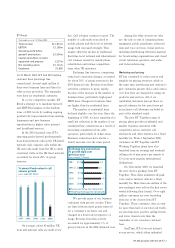BT 2001 Annual Report Download - page 20
Download and view the complete annual report
Please find page 20 of the 2001 BT annual report below. You can navigate through the pages in the report by either clicking on the pages listed below, or by using the keyword search tool below to find specific information within the annual report.
Business review
20 BT Annual report and Form 20-F
Regulation in the UK
The regulatory structure for UK
telecommunications is set out principally
in the Telecommunications Act 1984,
which gives regulatory authority to the
Secretary of State for Trade and Industry
and the Director General of
Telecommunications, who heads the
O⁄ce of Telecommunications (Oftel). The
Secretary of State and the Director
General are required to ensure, as far as
reasonably practical, that all reasonable
demand for telecommunication services,
including certain community services, is
met and to secure the ability of licensed
telecommunications operators to ¢nance
the provision of the services which they
are licensed to provide. In addition, they
are required, among other things, to
promote the interests of consumers,
purchasers and other users in the prices,
variety and quality of telecommunication
services and equipment, and to promote
and maintain e⁄ciency and e¡ective
competition among UK
telecommunications operators.
With limited exceptions, a licence
under the Telecommunications Act is
required to operate a telecommunication
system in the UK. The Secretary of State
is responsible for issuing licences after
consulting the Director General.
The BT Licence
BT operates in the UK under a number
of licences, the most important of which
is its licence to operate its ¢xed-line
public telecommunications network (the
‘‘Licence’’). The Licence remains in force
inde¢nitely, but the Secretary of State
may revoke the Licence on 10 years’
notice. The Licence can also be revoked
at any time on various grounds,
including non-compliance with its terms.
The Licence contains terms and
conditions designed principally to ensure
the widespread provision of
telecommunication services in the UK, to
protect the interests of consumers and to
encourage the development of e¡ective
competition in telecommunication
services and network provision within
the UK.
Under the Licence, BT has to ful¢l
reasonable requests for access to voice
telephony, low-speed data and fax
transmission services, and reasonable
access to public call boxes throughout
nearly all the UK, including rural areas
(these being the principal elements of the
Universal Service Obligation).
Under the Licence, the company
must allow other licensed operators to
interconnect with its telecommunications
systems on cost-oriented, transparent
and non-discriminatory terms.
The company must comply with a
variety of fair trading obligations, such as:
&a prohibition on showing undue
discrimination or unfairly favouring
any part of its own business as
against competitors on the basis of
price terms or quality of service; and
&a prohibition on the unfair cross-
subsidy of certain activities of the
company.
BT must publish audited ¢nancial
statements for the regulated ‘‘businesses’’
and ‘‘activities’’, in order to support the
linkage of costs with interconnect prices
and with a view to providing
demonstrable evidence that BT is neither
behaving in a discriminatory fashion nor
unfairly subsidising its activities. If it
appears to the Director General that an
unfair cross-subsidy exists between
speci¢ed parts of its own business, BT
must take such steps as the Director
General may direct to remedy the
situation. The regulatory businesses for
which separated accounts are currently
produced are access, apparatus supply,
network, retail systems, supplemental
and residual services. In addition, for the
¢rst time, BT produced separated
¢nancial statements for its mobile
business for the 2000 ¢nancial year. The
Licence also contains provisions enabling
the Director General to monitor the
company’s activities, including
requirements for BT to supply him with
information requested.
The Licence permits the imposition
of price control formulae, the overall
e¡ect of which requires the company to
reduce, or restricts the extent to which it
can increase, the prices of many of its
telephony services to the bulk of the
residential market and also the prices for
its interconnection services. In addition,
the Licence contains certain speci¢c
restrictions on the terms on which BT
can trade. In particular, the company is
required to publish and adhere to
standard prices and other terms for
providing certain services.
The Director General may make
modi¢cations to a licence if the licensee
does not object or if the amendment is
deregulatory. Alternatively, he may refer
proposed changes to the licence to the
Competition Commission (‘‘CC’’). In either
case, the Telecommunications Act
requires public consultation before a
licence can be modi¢ed.
Licences may also be modi¢ed by
legislation, including legislation
implementing European Commission
directives into UK law.
Implementation of Licensing Directive
In September 1999, modi¢cations to the
Licence came into force to meet the
harmonisation requirements of the
European Community Licensing
Directive (the ‘‘Directive’’). The intention
of the Directive was to prevent excessive
or unjusti¢ed regulation through
licensing of telecommunications. The
modi¢cations included the removal, from
January 2001, of restrictions that
prevented BT from competing in the
conveyance and provision of broadcast
visual services to homes in the whole of
the UK.
























